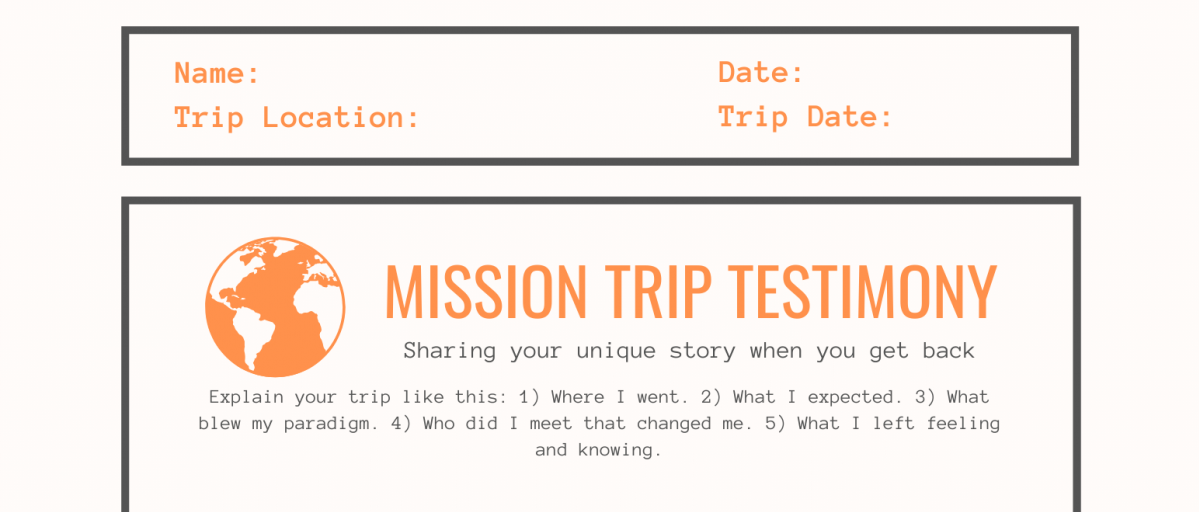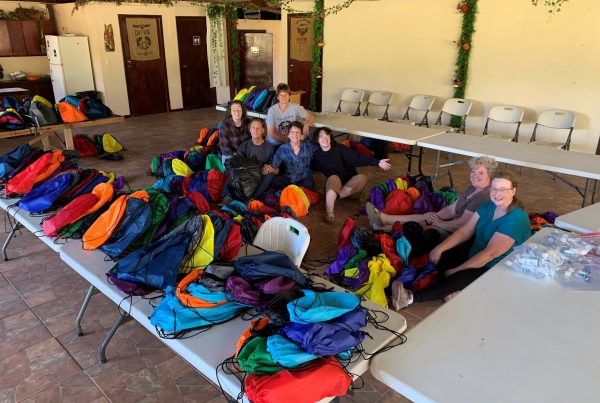At the bottom, there is a free download for working on your testimony from your mission trip! That is our free gift to you and we hope it helps you process everything well.
What often happens to people on mission trips
Mission trips are amazing in that they simply deliver on what they promise. These trips offer perspective, adventure, real confrontation with your comfort zones, and lots of intense emotion.
People don’t realize it as things are happening, but your world is being tipped upside down. Everything you’ve known to be normal and comfortable isn’t the case where you are now. This can make it hard to process what is happening on a trip.
Outside of the mind-bending things you encounter such as customs, food, lifestyles, and quality of life, some things make more of an impact.
The wonderful people you meet
You see people. What’s more, is that you meet and talk with people. You play with their children. You see their homes and their paths to work or play. You see their poverty and their ingenuity in hardship.
It is sort of like going on a first date. You are sitting in front of people learning all about their lives. Some of it brings joy to your hearts. Other things make you want to cry or change their situation right then and there. That is the promise of meeting all sorts of different people; you will see things you never hoped or imagined.
All in all, it is hard to know exactly what to expect going in. Especially if you go on the mission trip with the right motives, you will be in prime condition to get wrecked in all the awfully great and unpredictable ways.
Coming off of the trip it’s hard to share this with people who didn’t see what you saw. Isn’t it difficult to relate emotion the first time you encounter it? Like a 12-year-old flustering from seeing their crush but they don’t know what is happening to them.
But you can think through every aspect of the trip, in prayer, and come up with a pretty stellar way of conveying what you saw, did, and felt! This fact makes this process a lot better because I hope you know that even for introverts or emotionally closed-off people (myself included), you can share a moving story that inspires people and sets you up for a life of impacting people.
Sharing your testimony isn’t about being a professional orator or knowing how to captivate a crowd. It is about being raw but thoughtful about your experience. That is the most moving thing that you could do.
What is a testimony
A Christian testimony is an explanation of the benefits you’ve seen from God in a particular situation.
When you think about your mission trip images, thoughts, and memories flood your mind, most likely. You have a lot that you could say about your trips. Now, when you think about the life change you had from it and distilled that down into something easy to communicate, that is a testimony.
The need for telling people after the trip
When you come back from a trip you will inevitably share your experience. It can be hard to know what to share. But why share it at all? Well, people love you and have supported you on this journey so it is fair to share with them. Also, there will be things you just want to share.
People will ask
You were gone for 10 days and it is reasonable that people want to know where you’ve been. Others knew you were on the trip and wanted to go themselves but couldn’t; so they will want to hear all.
Other people supported you at fundraisers and some relatives that sent a check in the last month before your trip. They invested in your cause and took on your cause in a small way. So, they want to know what happened and how it changed you.
People at church are likely to want to hear all the cool stories of what you saw. Your non-Christian friends might be confused about why you went on the trip but might want all the exotic details.
The thing is, people are going to ask you about your trip. And it is hard to answer that honestly and without taking 17 days unless you have worked through it already. Downloading the worksheet below will help you answer all these people.
The steps for sharing your testimony
There are some simple steps that you can follow in coming up with what to share in your testimony. The important thing here is to start early and to work on it until you have fully processed it.
Lots of people have said that journaling or taking voice notes on the plane ride back is the best thing that they have done. You may have 5+ hours on that plane to jot it all down. And that is the best. The memories are raw in your head. If you can, journal every day of the trip so that you have notes to go back to and glean from.
Mission trips usually have memorable things at every corner, so it might be hard to remember every detail.
Explaining what happened on your trip
The first category of memories, emotions, and events you want to capture is ‘What happened on your trip’. These are the things that you are going to say that you did, saw, and experienced.
“Walking up the hill out of the jungle to the church where you would later help with the service. You were tired but when the room filled up and service started, you knew that all were going to be blessed.”
Recounting the things you did and the places you went to is important because it gives context for the really important aspects of your testimony.
Discovering where you were before the trip
Part of sharing a testimony about your mission trip is explaining the headspace you were in before the trip. What paradigms did you go into the trip with? What biases did you have? Where was your faith? Were you excited, scared, nervous, indifferent about the trip beforehand?
Knowing where you started provides the backdrop of the life change you experienced on the trip. It shows a starting point. A place that you wouldn’t want to go back to and a place that you would want to encourage other people to not stay either.
This section also acts as a bridge between you and your audience. They didn’t go on a mission trip. You did. The only want to spur them on is to be real about what you felt and believed for the trip. Then, as you walk through the things you did do (the previous section) we can see the really important takeaways.
Sharing the life change you experienced and encouraging others
This is the powerful part.
You’ve set the scene perfectly. You have in mind what you did on the mission trip. Weird things you stepped in and the effort it took all are right there at the forefront of everyone’s minds. You have then explained what sort of condition your heart and faith were before the trip.
Now, you get to unload a whole lot of excitement and hope on your hearers. Connect the things that you did on your trip with where you were before the trip. What did those things do to you? Did you stay up the second night and just pray? Did you feel called to reorder your life when you got home to be more centered on other people? Did you get a business idea that would be able to make money that you could use for these and other people?
The point isn’t to make up a story but to recount the transformation that did happen. Even if it is small, it is powerful. Simply saying, “You know, its been 5 weeks since my trip and I have prayed and read my Bible every day before going to class,” is more powerful than you initially think.
Remember to connect the things that you did to the condition you were at and explain, gently, how that brought about change.
Mistakes people make in sharing their mission trip testimony
Now, with that framework, you should be able to process your trip and be able to explain it well to people or your church with a bit of work. Here are things to avoid in sharing your testimony and then you can download that worksheet.
Condemning people
 It isn’t uncommon to come back from a mission trip and see the excess of our lives. Why are we wasting water when others have nothing to drink? Why does nobody care about the spiritual condition of the world? Why are we so apathetic?
It isn’t uncommon to come back from a mission trip and see the excess of our lives. Why are we wasting water when others have nothing to drink? Why does nobody care about the spiritual condition of the world? Why are we so apathetic?
It is really easy to start condemning everyone we know and try to get them to change. But, this isn’t the way of Christ.
We know that the anger of man doesn’t produce the righteousness of God. (James 1:20)
Instead, we should order our lives differently and start with ourselves. Then invite people to join your journey. Host prayer events, fundraisers, and information sessions but don’t be quick to call out other people. Just give them an opportunity to get involved and gain perspective.
Making commitments to go back or to stay
Something that many people do while they are leaving is telling the missionary hosts that they will come back ASAP. Well, the high of the trip wears off and most people end up forgetting their promises, but the missionaries and the locals don’t. They just see you not coming back.
Instead, leave them being thankful for the trip. Ask how you can support them. And, if you are able to visit again, do it. Just don’t promise what you can’t when you are at the peak of your mission trip emotion.
Sinking into sadness
For the reasons above, it is easy to get really sad when you get back. Maybe you miss being on the field or mission the people you met. Or, maybe, you feel like American life is just so far off from how it should be. There are so many reasons to be down, but know that you have a life ahead of you that you can use to change lives.
Knowing what you saw and that it made a difference is great when it is put to use. I encourage you to solidify your story and inspire others. Inspire not condemn.
Mission Trip Testimony Worksheet
We hope that this is helpful to you. Here is a worksheet that you can download and print off. I would say, print of 5 or so, and on each sheet focus on a different transformative moment, you had on your trip. That way you really maximize the experience you had on the field when talking with others.
We love you short term folk and want the best for you in your life. If you ever are looking for more trips to join, keep us in mind and look at our calendar to see any open trips.





